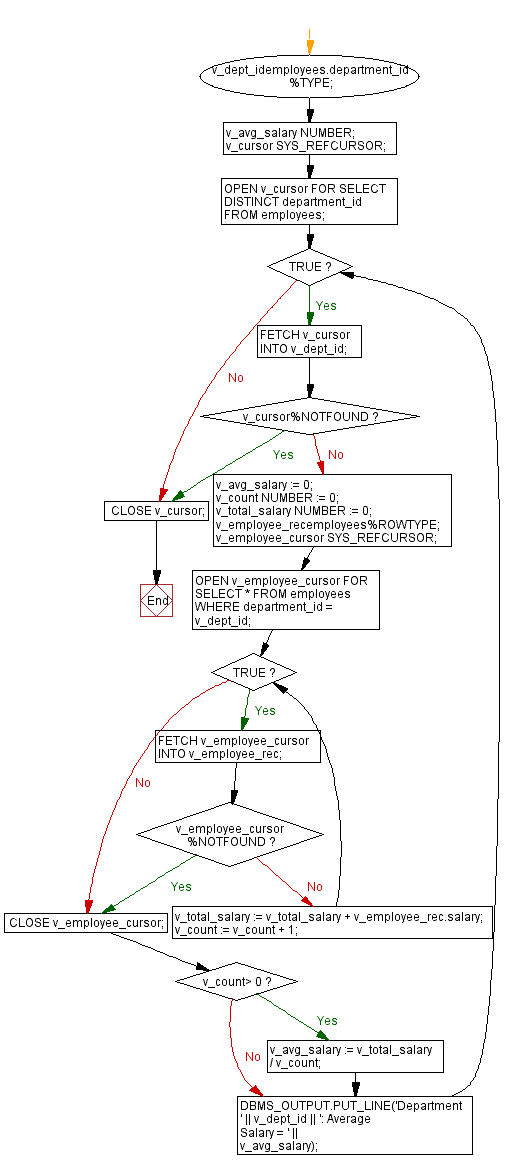PL/SQL Program to Display Average Salary for Each Department
PL/SQL While Loop: Exercise-18 with Solution
Write a PL/SQL program to display the average salary for each department.
Sample Solution:
Table: employees
employee_id integer first_name varchar(25) last_name varchar(25) email archar(25) phone_number varchar(15) hire_date date job_id varchar(25) salary integer commission_pct decimal(5,2) manager_id integer department_id integer
PL/SQL Code:
DECLARE
v_dept_idemployees.department_id%TYPE;
v_avg_salary NUMBER;
v_cursor SYS_REFCURSOR;
BEGIN
OPEN v_cursor FOR
SELECT DISTINCT department_id
FROM employees;
WHILE TRUE LOOP
FETCH v_cursor INTO v_dept_id;
EXIT WHEN v_cursor%NOTFOUND;
v_avg_salary := 0;
DECLARE
v_count NUMBER := 0;
v_total_salary NUMBER := 0;
v_employee_recemployees%ROWTYPE;
v_employee_cursor SYS_REFCURSOR;
BEGIN
OPEN v_employee_cursor FOR
SELECT *
FROM employees
WHERE department_id = v_dept_id;
WHILE TRUE LOOP
FETCH v_employee_cursor INTO v_employee_rec;
EXIT WHEN v_employee_cursor%NOTFOUND;
v_total_salary := v_total_salary + v_employee_rec.salary;
v_count := v_count + 1;
END LOOP;
CLOSE v_employee_cursor;
IF v_count> 0 THEN
v_avg_salary := v_total_salary / v_count;
END IF;
END;
DBMS_OUTPUT.PUT_LINE('Department ' || v_dept_id || ': Average Salary = ' || v_avg_salary);
END LOOP;
CLOSE v_cursor;
END;
/
Sample Output:
Department 50: Average Salary = 3475.55555555555555555555555555555555 Department 40: Average Salary = 6500 Department 110: Average Salary = 10150 Department 70: Average Salary = 10000 Department 90: Average Salary = 19333.3333333333333333333333333333333333 Department 30: Average Salary = 4150 Department 10: Average Salary = 4400 Department : Average Salary = 0 Department 20: Average Salary = 9500 Department 60: Average Salary = 5760 Department 100: Average Salary = 8600 Department 80: Average Salary = 8955.8823529411764705882352941176470
Explanation:
The said code in Oracle's PL/SQL that retrieves distinct department IDs from the 'employees' table and calculates the average salary for each department.
The variables "v_dept_id" that holds the department ID, "v_avg_salary" that stores the calculated average salary, and the cursor "v_cursor" fetches the distinct department IDs by a select statement from the 'employees' table are declared.
Within the outer WHILE loop the cursor fetches a department ID into "v_dept_id" and it continues until no more rows are found and the loop is terminated.
Within the inner loop the average salary is initialized to 0, and variables "v_count" and "v_total_salary" are initialized to keep track of the number of employees and their total salary, respectively.
A nested cursor "v_employee_cursor" fetches the employees for the current department using the "v_dept_id" value.
Within the inner WHILE loop each employee's salary is added to the "v_total_salary" variable, and the "v_count" variable is incremented and the loop continues until there are no more rows to fetch from the cursor.
The average salary is calculated by dividing the total salary by the count provided by there are one or more employees in the department.
The DBMS_OUTPUT.PUT_LINE() function displays the output, includes the department ID and the calculated average salary.
Flowchart:

Go to:
PREV : Employee count by country.
NEXT : PL/SQL code to find highest salary employee in each department.
Improve this sample solution and post your code through Disqus
What is the difficulty level of this exercise?
